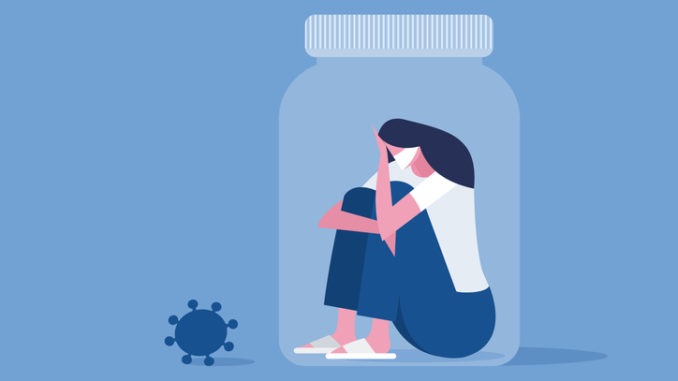
The recent surge in cases of COVID-19 in the UK has deepened concern over the pandemic’s possible mental health consequences.
This is an edited version of an article that originally appeared in The BMJ
COVID-19 has raised the prevalence of anxiety, depression, post-traumatic stress disorder, and psychological and mental distress among the general population. Living with young children, pre-existing chronic or mental illness, young age, female gender, and frequent exposure to pandemic news are all risk factors associated with COVID-19 related distress, and rates of suicidal thoughts increased in people aged 18-29 during the pandemic, highlighting the particular toll of COVID-19 on young people.
Repeated episodes of lockdown, periods of self-isolation after contact with infected people, social distancing, and the fear of contracting COVID-19 when outside the home, can lead to heightened fear and anxiety in people of all ages. Self-isolation is associated with symptoms of post-traumatic stress, anxiety, adjustment disorder, confusion and anger.
The implications of COVID-19 for people with pre-existing mental illness are of particular concern, along with the likelihood that COVID-19 will further widen mental health inequalities for ethnic minority groups. Against this backdrop, mental health support through primary care is a priority for patients, the public, commissioners, researchers and policy-makers.
Around 90% of mental health problems are managed entirely in primary care, and general practitioners report that mental health constitutes around 40% of their workload. The World Health Organization suggests that good primary care management of people with mental health problems reduces stigma and improves access to treatment; early intervention in primary care has been shown to reduce subsequent mental health problems and be cost effective.
COVID-19 has changed general practice at scale, including the near universal implementation of remote consulting, which is new to many primary care teams in the UK. Primary care is now at the forefront of the predicted increase in mental health presentations; COVID-19 is thought to have affected, or be likely to affect, the mental health of around 10m people through lockdown restrictions due to concerns about employment, finances, personal safety, or the safety of family members and bereavement. The wellbeing of children and young people has been further undermined by educational disruption and isolation from peers.
Patients with long COVID describe the fear, uncertainty and despair caused by persistent symptoms, and emphasise mental health support as a key part of recovery. People with active COVID-19 are worried about their prognosis, while those admitted to intensive care—and their families and carers—experience substantial mental health distress. These are all risk factors for subsequent mental illness.
Rates of self-harm, and common mental health conditions, were lower than expected in primary care during the early stages of the pandemic, but concern remains about a possible rebound effect causing higher rates of mental health problems, self-harm and suicide in the coming months and years.
Future priorities
Primary care needs urgent and sustained mental health investment to provide early identification of mental health conditions, timely intervention and treatment, prevention, ongoing support and access to specialist mental healthcare services; this should be a priority for the integrated care systems at the heart of NHS restructuring proposals.
Increased capacity and enhanced access to psychological therapies in primary care are essential for all age groups – for example, through the improving access to psychological therapies programmes – along with increased support for grassroots community initiatives.
Remote primary care consultations for mental health have not been evaluated in the UK, and the loss of in-person interaction between clinician and patient may undermine the rapport essential for effective mental healthcare. Remote consultation may also reduce a clinician’s ability to identify important cues – including the possibility of substance misuse, domestic violence, self-harm, grief, low mood, signs of psychosis, or anxiety – particularly in young people, parents and carers. Primary care professionals must have the time and resources required to support patients to self-care, in line with recent guidance by the Royal College of General Practitioners.
Research to identify best practice for remote mental health consultations in primary care is urgently required, including studies exploring both enablers and barriers to accessing remote mental health support. Changes to services must not be allowed to widen health inequalities further, through digital exclusion, for example. How to provide safe and effective care for people without stable access to digital devices should be a research priority.
We must refocus, rebuild and revitalise mental health support through primary care to aid the recovery from COVID-19, to streamline health services, promote positive mental health and be ready for future uncertainties.

Be the first to comment